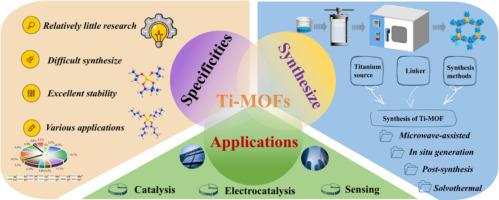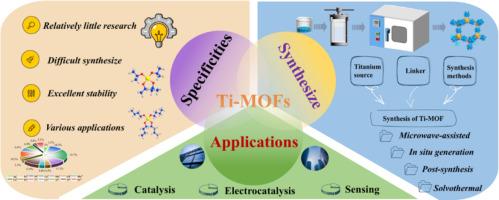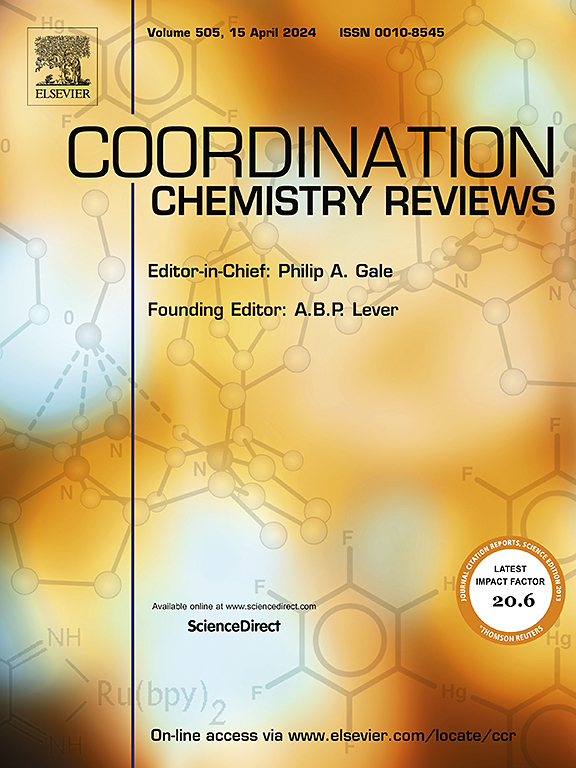钛基金属有机框架:合成创新和多功能应用
IF 23.5
1区 化学
Q1 CHEMISTRY, INORGANIC & NUCLEAR
引用次数: 0
摘要
金属有机骨架(mof)由于其显著的结构可调性和多种特性,在许多不同的领域引起了人们的广泛关注。钛基金属有机骨架(ti - mof)是mof的一个重要分支,由于其独特的电子结构、氧化还原活性、高稳定性和钛离子的配位化学性质,与其他mof基材料相比具有明显的优势。此外,这些MOFs在光催化、电催化、能量存储和传感方面表现出优异的性能,为解决实际应用中的关键挑战提供了新的方法和潜在的解决方案。本文综述了Ti-MOFs的合成策略、结构特点及其在催化、储能和传感等领域的应用。我们总结了该领域的最新进展,重点介绍了ti - mof的合成和应用所面临的挑战。本工作旨在为未来的研究提供新的见解和指导,强调创新方法来提高ti - mof的性能并扩大其实际应用。本文章由计算机程序翻译,如有差异,请以英文原文为准。


Titanium-based metal-organic frameworks: Synthesis innovations and multifunctional applications
Metal-organic frameworks (MOFs) have attracted a lot of interests in many different sectors due to their remarkable structural tunability and variety of characteristics. Titanium-based metal–organic frameworks (Ti-MOFs), a prominent subset of MOFs, possess distinct advantages over other MOF-based materials owing to the unique electronic structure, redox activity, high stability, and coordination chemistry of titanium ions. Furthermore, these MOFs exhibit superior performance in photocatalysis, electrocatalysis, energy storage, and sensing, offering novel approaches and potential solutions to address the critical challenges in practical applications. This review provides a comprehensive summary of Ti-MOFs, focusing on their synthesis strategies, structural characteristics, and multifunctional applications in catalysis, energy storage, and sensing. We summarize the recent advancements in the field, highlighting key achievements and addressing the challenges faced in the synthesis and application of Ti-MOFs. This work aims to offer new insights and guidance for future research, emphasizing innovative approaches to enhance the performance of Ti-MOFs and expand their practical applications.
求助全文
通过发布文献求助,成功后即可免费获取论文全文。
去求助
来源期刊

Coordination Chemistry Reviews
化学-无机化学与核化学
CiteScore
34.30
自引率
5.30%
发文量
457
审稿时长
54 days
期刊介绍:
Coordination Chemistry Reviews offers rapid publication of review articles on current and significant topics in coordination chemistry, encompassing organometallic, supramolecular, theoretical, and bioinorganic chemistry. It also covers catalysis, materials chemistry, and metal-organic frameworks from a coordination chemistry perspective. Reviews summarize recent developments or discuss specific techniques, welcoming contributions from both established and emerging researchers.
The journal releases special issues on timely subjects, including those featuring contributions from specific regions or conferences. Occasional full-length book articles are also featured. Additionally, special volumes cover annual reviews of main group chemistry, transition metal group chemistry, and organometallic chemistry. These comprehensive reviews are vital resources for those engaged in coordination chemistry, further establishing Coordination Chemistry Reviews as a hub for insightful surveys in inorganic and physical inorganic chemistry.
 求助内容:
求助内容: 应助结果提醒方式:
应助结果提醒方式:


